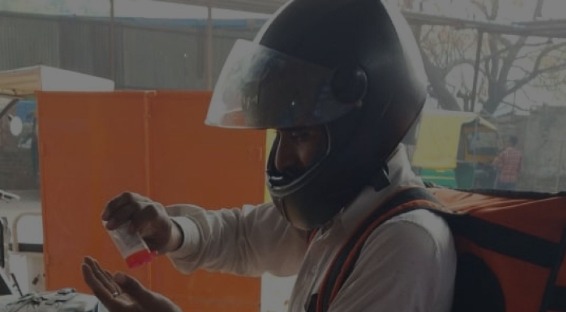India on lockdown: Are home deliveries safe from coronavirus?
The companies in the industry have taken several steps to minimize the risk but the delivery agents are still out there all day and are on the frontline in terms of exposure and risk to the spread of COVID 19.

- Country:
- India
India’s population of about 1.3 billion has been ordered to stay at home for 21 days to break the infection cycle of the novel coronavirus. All commercial establishments have to either allow their employees to work from home or suspend operations for the period of lockdown, except those that provide essential services.
The list of essential services also includes e-commerce and home delivery services, which just shows how the startups which were once considered non-viable have now become an ‘essential’ part of our everyday life.
From staple food to washing powders, almost everything can be delivered at your doorsteps and the companies are continuously improving on customer experience and quick services. The demands for home deliveries had been surging even before the lockdowns as many companies advised their employees to work from home.
The companies in the industry have taken several steps to minimize the risk but the delivery agents are still out there all day and are on the frontline in terms of exposure and risk to the coronavirus.
Is it safe to order home deliveries?
Studies have found that the new coronavirus that causes COVID-19 remains for several hours to days on surfaces.
A recent study suggested that the virus is detectable for up to 24 hours on cardboard, which is the most common material for making delivery boxes. Another common material used for making delivery packaging in plastic (especially in case of food deliveries), and the same study suggests that the virus can survive up to 2-3 days on plastic and stainless steel.
The study was published in the New England Journal of Medicine jointly authored by researchers at the University of Princeton and UCLA, National Institute of Allergy and Infectious Diseases, the Centers for Disease Control and Prevention (CDS) of the USA.
In the case of food deliveries, so far, there is no evidence of food or food packaging being associated with the transmission of COVID-19. However, according to the USA's Food and Drug Administration, the food vendors should “follow the 4 key steps of food safety—clean, separate, cook, and chill.” Another research by Harvard Medical School concluded that the virus might be killed by cooking properly but that may not be the case with uncooked foods like salads or sandwiches, it adds.
Steps being taken to minimize the risk
While home deliveries don’t completely eliminate the risk, they are certainly a lot safer than actually going out. Companies working in the sector have already taken various steps to ward off the risk for both the customers and the delivery agents.
As the demand soared due to coronavirus scare in India, many food deliveries and e-commerce companies started ‘contactless deliveries’ following the footsteps of other players in China, Europe, and the US.
In contactless deliveries, the delivery agent doesn’t have to hand over a package to another person, instead, he now puts the packages down and then steps away to a safe distance, waits for the customer to collect it or send a picture of the packages to the customer and then leaves.
Here is what we are doing as precautionary measures to address COVID-19. Contactless food delivery is already available on the @zomato app through our ‘delivery instructions’ feature. An app update over the weekend will make this explicitly clear to everyone. pic.twitter.com/HJ012g5zfH
— Deepinder Goyal (@deepigoyal) March 13, 2020
As fever is one of the main symptoms of the infection, Indian startups are mandating body temperature scanning of their employees to ensure they don't have a fever and their bags and clothes are disinfected by their employers.
We have and will always ensure that all required measures are taken to implement the highest standards of safety! Get #GroceryDeliveredSafely at your place without any worries. pic.twitter.com/nvYA9OX5VX
— Grofers (@Grofers) March 18, 2020
Residential complexes should also support these new delivery options and equip their security and reception staff with body temperature scanners to screen delivery agents.
To prevent coronavirus from spreading customers can also take precautions like wearing gloves while handling the package, washing hands properly after opening the package and safely disposing of the outer packaging.
With adequate precautions, home delivery is certainly a safer alternative in the fight against coronavirus and governments across the world are quickly adapting to it.
(Disclaimer: The opinions expressed are the personal views of the author. The facts and opinions appearing in the article do not reflect the views of Devdiscourse and Devdiscourse does not claim any responsibility for the same.)
- FIRST PUBLISHED IN:
- Devdiscourse
ALSO READ
Supreme Court Reviews Vaccine-Induced Deaths Amidst COVID-19 Crisis
ICMR Study Finds COVID-19 Vaccination Lowers Risk of Sudden Death in Young Adults
Italy's U-turn on COVID-19 Fines: A Controversial Decision
Italy's Economic Woes in the Wake of COVID-19: A Stark Contrast with Spain
China Urges Trump Administration for Renewed Collaboration Amid COVID-19 Strains










